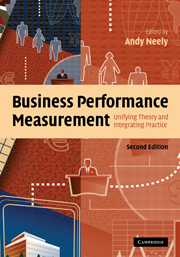Book contents
- Frontmatter
- Contents
- List of figures
- List of tables
- List of boxes
- List of contributors
- Introduction
- Part I Performance measurement – functional analyses and theoretical foundations
- 1 Accounting performance measurement: a review of its purposes and practices
- 2 Measuring marketing performance: research, practice and challenges
- 3 Measuring performance: the operations management perspective
- 4 Measuring performance: the supply chain management perspective
- 5 Finding performance: the new discipline in management
- 6 A conceptual and operational delineation of performance
- Part II Performance measurement – frameworks and methodologies
- Part III Performance measurement – practicalities and challenges
- Part IV Performance measurement in public services
- Part V Performance measurement – emerging issues and enduring questions
- Index
- References
6 - A conceptual and operational delineation of performance
Published online by Cambridge University Press: 22 September 2009
- Frontmatter
- Contents
- List of figures
- List of tables
- List of boxes
- List of contributors
- Introduction
- Part I Performance measurement – functional analyses and theoretical foundations
- 1 Accounting performance measurement: a review of its purposes and practices
- 2 Measuring marketing performance: research, practice and challenges
- 3 Measuring performance: the operations management perspective
- 4 Measuring performance: the supply chain management perspective
- 5 Finding performance: the new discipline in management
- 6 A conceptual and operational delineation of performance
- Part II Performance measurement – frameworks and methodologies
- Part III Performance measurement – practicalities and challenges
- Part IV Performance measurement in public services
- Part V Performance measurement – emerging issues and enduring questions
- Index
- References
Summary
Introduction
In this chapter the authors address the questions of what performance is and how to create it. The authors develop a series of nine propositions that, taken together, provide an answer to these questions.
After a brief overview of the reasons that led to these questions, and a review of the relevant literature that shows the diversity of meanings of “performance”, the authors develop step by step the process that leads to performance, showing it to be a social construct that results from the identification and the sharing of a causal model. That observation leads to the conclusion that performance is meaningful only within a decision-making context. The concept of performance is, therefore, specific to a given set of decision makers. Creating alignment between decision makers both inside and outside the firm is a prerequisite for performance to occur.
In the last sections of the contribution, the authors show the impact of responsibility assignment and of measurement on the operational definition of performance. All in all, the nine propositions form the basis on which performance can be defined, identified, measured and managed.
Performance
The word “performance” is widely used in all fields of management. In the management control area, terms such as “performance management” (Euske, Lebas and McNair, 1993), “measurement”, “evaluation” (e.g. Bruns, 1992) and “appraisal” are used. Despite the frequency of use of the word, its precise meaning is rarely explicitly defined by authors, even when the main focus of the article or book is performance (e.g. Neely, Gregory and Platts, 1995; Corvellec, 1994).
Information
- Type
- Chapter
- Information
- Business Performance MeasurementUnifying Theory and Integrating Practice, pp. 125 - 140Publisher: Cambridge University PressPrint publication year: 2007
References
Accessibility standard: Unknown
Why this information is here
This section outlines the accessibility features of this content - including support for screen readers, full keyboard navigation and high-contrast display options. This may not be relevant for you.Accessibility Information
- 32
- Cited by
